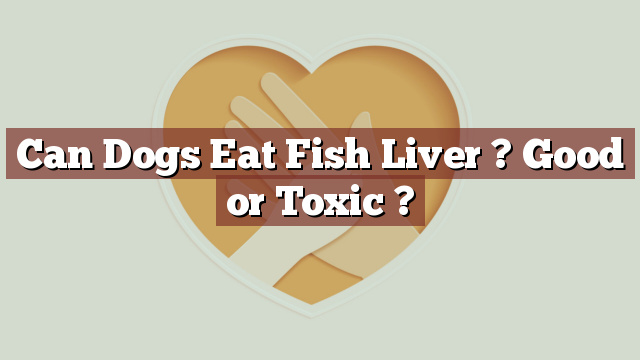Can Dogs Eat Fish Liver? Good or Toxic?
Knowing what foods are safe for our pets is essential to their overall health and well-being. Fish liver is a food that may be questioned when it comes to dogs. In this article, we will explore the nutritional value of fish liver for dogs, determine if it is safe or toxic for them, discuss potential risks and benefits, provide guidance on what to do if your dog eats fish liver, and conclude with considerations for feeding fish liver to dogs.
Nutritional Value of Fish Liver for Dogs
Fish liver, like other organ meats, is known to be highly nutritious. It is rich in vitamins A, D, and B12, as well as omega-3 fatty acids. Vitamin A is essential for maintaining healthy vision, immune function, and cell growth. Vitamin D plays a crucial role in regulating calcium and phosphorus levels, ensuring strong bones and teeth. Additionally, omega-3 fatty acids contribute to reducing inflammation and promoting a healthy coat and skin.
Is Fish Liver Safe or Toxic for Dogs?
Yes, dogs can eat fish liver. In fact, when served in moderation and prepared properly, fish liver can be a beneficial addition to their diet. It is important to note that the liver should come from fish that are safe for dogs to consume, such as salmon or cod. However, it is crucial to avoid fish liver from species that contain high levels of mercury, such as swordfish or tuna, as it can be harmful to dogs.
Potential Risks and Benefits of Feeding Fish Liver to Dogs
Feeding fish liver to dogs in appropriate amounts can provide several health benefits. As mentioned earlier, the liver is a rich source of vitamins and omega-3 fatty acids, which can support various aspects of a dog’s well-being. However, it is important to remember that moderation is key. Feeding excessive amounts of fish liver can lead to vitamin A toxicity, which can cause serious health problems, including bone abnormalities and liver damage. Therefore, it is crucial to consult with a veterinarian to determine the appropriate serving size for your dog based on their breed, size, and overall health.
What to Do If Your Dog Eats Fish Liver
If your dog accidentally consumes fish liver, it is important to monitor their behavior and watch for any signs of discomfort or illness. If they only consumed a small amount and show no adverse reactions, there is generally no cause for concern. However, if your dog exhibits symptoms such as vomiting, diarrhea, excessive thirst, or loss of appetite, it is recommended to seek veterinary advice immediately. The veterinarian will be able to assess the situation and provide appropriate guidance based on your dog’s individual condition.
Conclusion: Considerations for Feeding Fish Liver to Dogs
In conclusion, fish liver can be a nutritious addition to a dog’s diet when served in moderation and from safe fish species. It provides essential vitamins and omega-3 fatty acids that contribute to their overall health. However, it is crucial to avoid fish liver from species high in mercury and to consult with a veterinarian to determine the appropriate serving size for your dog. As responsible pet owners, it is our duty to ensure that we provide our furry friends with a balanced and healthy diet that meets their specific needs.
Thank you for investing your time in exploring [page_title] on Can-Eat.org. Our goal is to provide readers like you with thorough and reliable information about various dietary topics. Each article, including [page_title], stems from diligent research and a passion for understanding the nuances of our food choices. We believe that knowledge is a vital step towards making informed and healthy decisions. However, while "[page_title]" sheds light on its specific topic, it's crucial to remember that everyone's body reacts differently to foods and dietary changes. What might be beneficial for one person could have different effects on another. Before you consider integrating suggestions or insights from "[page_title]" into your diet, it's always wise to consult with a nutritionist or healthcare professional. Their specialized knowledge ensures that you're making choices best suited to your individual health needs. As you navigate [page_title], be mindful of potential allergies, intolerances, or unique dietary requirements you may have. No singular article can capture the vast diversity of human health, and individualized guidance is invaluable. The content provided in [page_title] serves as a general guide. It is not, by any means, a substitute for personalized medical or nutritional advice. Your health should always be the top priority, and professional guidance is the best path forward. In your journey towards a balanced and nutritious lifestyle, we hope that [page_title] serves as a helpful stepping stone. Remember, informed decisions lead to healthier outcomes. Thank you for trusting Can-Eat.org. Continue exploring, learning, and prioritizing your health. Cheers to a well-informed and healthier future!

